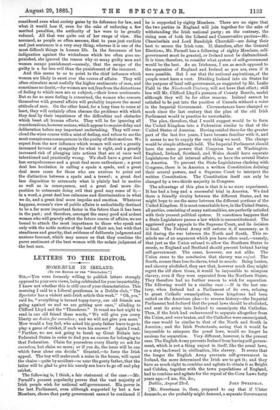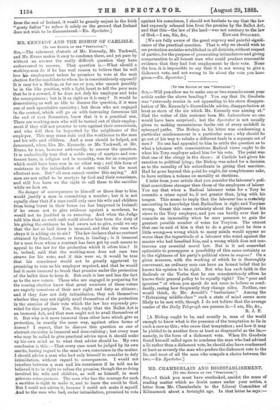LETTERS TO THE EDITOR.
HOME-RULE IN IRELAND.
ITO THE EDITOR OP THE SPECTATOH."]
`Sin,—Yon were formerly willing to publish letters strongly opposed to your own views, being celebrated for your impartiality. I know not whether this is still one of your characteristics. This morning I said to a Liberal gentleman in a Dublin club, " The Spectator has a violent anti-Irish article this week." " Oh, yes," said he, " everything is turned topsy-turvy, our old friends are going against us and we are getting new ones," alluding to Clifford Lloyd and the " Thunderer." It vexed me last night to read in our old friend these words, " We will give you every liberty we desire for ourselves; and we will not give you more." How would a boy feel, who asked his gouty father leave to go to play a game •of cricket, if such were his answer P Again I read, "Further, we are not going to break up Great Britain into Federated States in order to find you an excuse for belonging to that Federation. Claim for yourselves every liberty we ask for 'ourselves, but claim no more; or if you do, the issue will be one which force alone can decide." Granted,—to force the Irish appeal. The boy will make such a noise in the house, will upset the chairs—quite by accident—so near the gouty father, that the latter will be glad to give his unruly son leave to go off and play cricket.
The following is, I think, a fair statement of the case :—Mr. Parnell's present popularity proves that the vast majority of Irish people wish for national self-government. His power in the last Parliament, even although supported by but a few Members, shows that party government cannot be continued if
he is supported by eighty Members. There are no signs that the two parties in England will join together for the sake of withstanding the Irish national party ; on the contrary, the rising men of both the Liberal and Conservative parties—Mr. Chamberlain and Lord Randolph Churchill—are doing their best to secure the Irish vote. If, therefore, after the General Elections, Mr. Parnell has a following of eighty Members, self- government must be granted, or Ireland must be disfranchised. It is time, therefore, to consider what system of self-government would be the best. As an Irishman, I am as much opposed to the separation of England and Ireland as you are, even if it were possible. But I see that the national aspirations.of the people must have a vent. Dividing Ireland into six States for the purpose of local self-government, as suggested by Mr. Leslie Field in the Nineteenth Century, will not have that effect; still less will Mr. Clifford Lloyd's panacea of County Boards, useful although they will be for other reasons. Ireland cannot be satisfied to be put into the position of Canada without a voice in the Imperial Government. Circumstances have changed so much since the last century that the plan of the old Irish Parliament would in practice be unworkable.
The plan, therefore, that I would suggest would be to form the United Kingdom into a Federation similar to that of the United States of America. Having resided there for the greater part of the last five years, I have become familiar with it, and it seems to me to supply the very thing we need. The change would be simple although bold. The Imperial Parliament should have the same powers that Congress has at Washington. England, Ireland, Scotland, and Wales should have separate Legislatures for all internal affairs, as have the several States in America. To prevent the State Legislatures clashing with Congress, there is in America a written Constitution defining their several powers, and a Supreme Court to interpret the written Constitution. The Constitution itself can only be changed by a two-thirds majority in Congress.
The advantage of this plan is that it is no mere experiment. It has had a long and a successful trial in America. We find there a friendly rivalry between the different States, and we might hope to see the same between the different portions of the United Kingdom. It is most remarkable how, in the United States, all parties, consisting of many nationalities, are perfectly satisfied with their present political system. It sometimes happens that a State Legislature passes a law which is unconstitutional. The aggrieved party appeals to the Supreme Court, and its decision is final. The Federal Army will enforce it, if necessary, as it did during the war between the North and South. This re- minds me of an argument which you have often used,—namely, that just as the Union refused to allow the Southern States to secede, so England and Scotland should prevent Ireland having self-government. The cases, however, are not alike. The Union came to the conclusion that slavery was unjust. The South, sooner than lose its slaves, tried to secede. Being beaten, and slavery abolished, they saw that, however much they might regret the old slave times, it would be impossible to reimpose slavery, even if they were separated from the Northern States. They therefore had no further reason to wish for separation The following would be a similar case :—If in the last cen- tury, when Ireland had a Parliament of its own, refusing to grant Catholic emancipation, these kingdoms had been united on the American plan—to reverse history—the Imperial Parliament had declared that the penal laws should be abolished, and sent its army into Ireland to emancipate the Catholics. Then, if the Irish had endeavoured to separate altogether from the Union, and were beaten, and the Catholics were emancipated, the case would be similar to that of the North and South in America ; and the Irish Protestants, seeing that it would be impossible to reimpose the penal laws, would no longer be anxious for separation. Very different, however, is the present case. The English Army prevents Ireland from having self-govern- ment, which is not a thing unjust in itself, like the penal laws, or a step backward in civilisation, like slavery. It seems that the longer the English Army prevents self-government in Ireland, the more determined the Irish are to get it ; and they have as much right to combine and agitate to obtain it as Bright and Cobden, together with the town populations of England, had to combine and agitate for the repeal of the Corn Laws forty years ago.—I am, Sir, &c.,
[Mr. Sweetman is, then, prepared to say that if Ulster demands, as she probably might demand, a separate Government



































 Previous page
Previous page